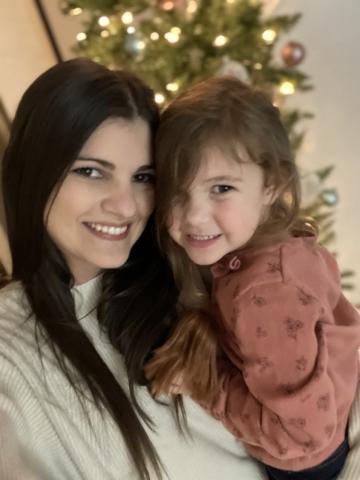Robyn Pefferkorn came to the classroom later than some.
The Church Point native had earned an associate degree after high school and worked in various fields before deciding at 25 to pursue a bachelor’s degree in education from the University of Louisiana at Lafayette.
Once she’d hit her stride teaching 10th graders English at David Thibodaux STEM Magnet Academy, she began looking for a way to grow and expand her opportunities within the field.
She found her path in UL Lafayette’s online M.Ed. in Curriculum and Instruction, Instructional Specialist concentration.
Onward and upward
Pefferkorn has been teaching since 2013 and knew she wanted the ability to branch out of the classroom, without necessarily dedicating herself to administration. In the master’s in curriculum and instruction, Pefferkorn saw that opportunity. 
“There's a lot of room for me to work at the university level or work at a company,” says Pefferkorn. “It gave me a lot of options, so I didn't feel just like locked in to being a principal or administrator.”
The program also allowed her to balance being a full-time teacher and mom to a rambunctious 4-year-old with her coursework.
"That’s why I chose the online program, because I wanted to be able to have like the freedom to work on my own time but still get my degree,” she says.
But, she admits, it was still a challenge. Staying on top of her coursework has required careful planning and dedicating consistent blocks of time.
She also found she was able to blend her coursework and classroom instruction in unexpected ways. As she was earning her master's degree, Pefferkorn transitioned to teaching English and dual-enrollment English to juniors and seniors. She had to quickly learn and adapt to a new curriculum. However, because many of her students are preparing to embark on their own collegiate paths, Pefferkorn used her coursework as examples of scholarly writing and research.
“I could blend both worlds there,” she says. “I would say, for example, ‘Hey, you see how I integrated this textual evidence, and do you see how I cited this,’ or, ‘In my class, we just read this book and then we can bring it into there.’ So, I was kind of teaching and doing coursework at the same time.”
Fresh perspectives
Although Pefferkorn had taken a couple online courses during her time in undergrad, she found the format had changed significantly over the last several years.
“It's definitely much more interactive, and I find that you get more out of it,” she says. “Now we have our forums, we can talk to the teacher, we can do Zoom, we can do all these like different things, so it definitely feels more like the class without having the set schedule. It's easier to work around a full-time job, kids, all of that.”
Those interactions provided fresh instructional perspectives from different content and geographic areas.
"You get a viewpoint of how it is in Baton Rouge, for example, or somewhere up north or even in another state, seeing how they handled different situations and what they implemented in their own classrooms and the different variety of things they plan to do,” she says.
She says that interaction extended beyond coursework to providing — and receiving — support and encouragement.
“There's a few of us working all at the same time and graduating together. So, we would text each other just for support, like, 'OK, I'm not feeling like doing this at all. Please convince me to do it.’ Just little things like that, having a support network and the professors have been great,” she says.
Pacing ahead
Pefferkorn says with her master’s degree in hand, she’s not sure what her next step might be.
"I’ve finished my master’s. I know I’m supposed to want to leave, but I enjoy being with the kids,” Pefferkorn says. "The crazy things they come up with, and their perspective on everything — it's just fresh.”
For now, she says she’s looking forward to juggling a little less to dedicate more to her instruction and her daughter.
“She knows that I do homework, so she'll ask like, ‘Mommy, do you have a project you have to do?’ But I really wanted to do it for her, too. That was a lot of motivation for me,” says Pefferkorn. “For her to see that even whenever there's so many things going on, if you have a goal for yourself, you have to go for it even if it's going to stress you out for a little bit. So I did it for her.”